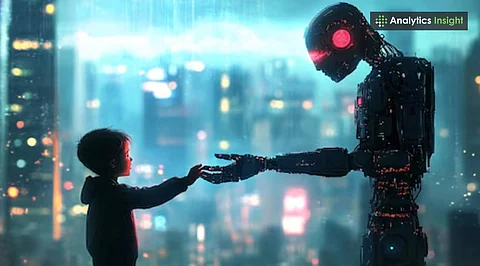

AI clones can assist in healthcare by replicating patient histories for faster treatment.
They improve productivity by automating repetitive and time-consuming tasks.
Ethical use and strong regulations are key to ensuring they benefit society.
AI clones sound like scary sci-fi. The prospect of machines copying people raises concerns, such as job losses, privacy issues, and wild future risks. The future of AI Clones points to industries like entertainment, healthcare, and education adopting them widely.
There are worries, but it's not all doom and gloom. Artificial Intelligence clones could make life easier, help businesses, and give us more free time. This piece explores what they are, discusses why people are concerned about them, and suggests that they might not be as bad as they seem.
It's a digital copy created by artificial intelligence to perform tasks that appear human. This could be a voice that sounds like someone real, a chatbot that acts like customer support, or a system that mimics the workflow of a professional to make things faster.
Also Read: How Can Businesses Use ChatGPT for Customer Support?
Exploring the Benefits of AI Clones in Society reveals how they can enhance productivity and preserve knowledge. AI clones aren't meant to take over the world. They just copy certain skills and help with everyday stuff.
The ongoing AI Ethics Debate centers around issues of privacy, consent, and responsible innovation. Cloning things freaks people out, and for good reason. Here's what's annoying everyone:
Privacy: What if someone snags your data and clones you without you even knowing?
Job Loss: People are scared that robots will take over all the jobs.
Ethics: What if clones are used to create fake voices or spread lies?
Artificial Intelligence clones? Real issues, sure. But they're just tools, like anything else. It's all about how we choose to use them and the rules we set.
Questions about Digital Identity and AI are becoming more urgent as clones blur the line between humans and machines. Even though there are worries, Artificial Intelligence clones could really help out in a few ways:
AI can help doctors keep track of patients' info, suggest diagnoses, and remind people to take their meds. This gives doctors more time to talk to patients.
If a student struggles with math, an AI tutor can adjust to their speed. Also, voice clones can read study materials to learners who have visual impairments.
Voice and character clones are being used more in movies, games, and online content. This brings down costs and lets creators try new features.
People worry about AI clones because they consider the potential risks. But clones could be helpful, not just replacements for humans. If we combine innovative thinking with sensible rules, clones can improve our world.
Governments and tech businesses are already working on rules to keep AI cloning from causing problems. Aspects such as openness, permission, and security will become increasingly important as this technology evolves.
Also Read: Why is AI Cloning of Voice Dangerous for Lawmakers?
To really get value from AI clones, we gotta have:
Good Rules: Laws that stop bad uses and keep privacy safe.
Be upfront: Folks should know when they're chatting with an AI.
People in Charge: AI should help us out, not take over.
AI copies get a bad rap because of films and some actual mistakes. But they should assist in health, school, work, and even art. We need to be smart and have good morals. We should view them as tools that can be beneficial if we are safe.
1. What are AI clones?
AI clones are digital systems designed to mimic human-like tasks such as voice, text, or workflows.
2. Are AI clones a threat to jobs?
AI clones mainly handle repetitive tasks, allowing humans to focus on complex and creative work.
3. Can AI clones help in healthcare?
Yes, they can assist doctors with patient records, reminders, and faster diagnosis support.
4. How are AI clones used in education?
They act as virtual tutors that adapt to student learning speeds and needs.
5. Are AI clones safe to use?
With proper regulations, transparency, and consent, AI clones can be used safely and responsibly.
